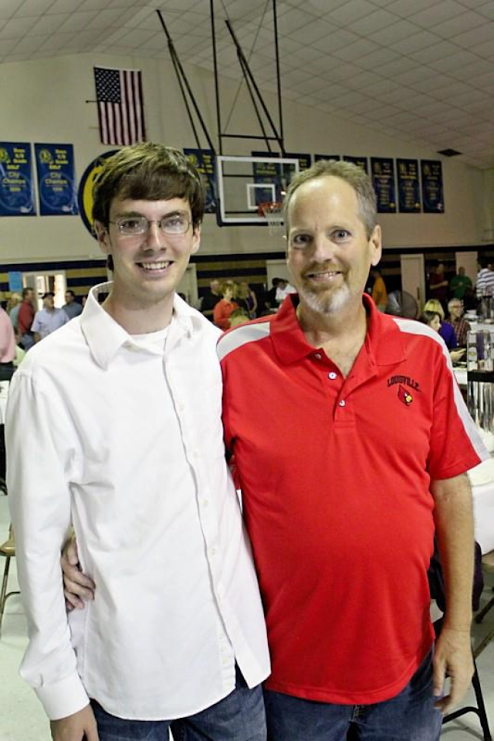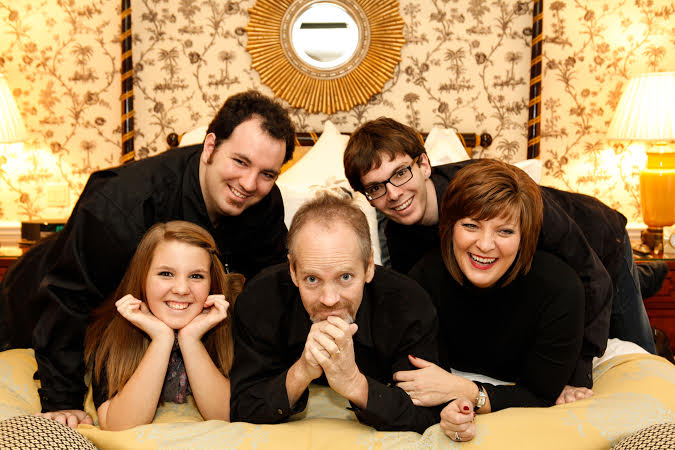Student Discovers Grief Support in his Friends

The morning of his graduation from high school, Clayton Selch woke up to a text from his mom, Pat.
“I had to take your dad to the hospital. I don’t know if we‘re going to make your graduation. We’re going to try, but there’s no guarantees,” the text read.
His father, Tom, had been sick since January, but this was his first visit to the hospital. Doctors suspected he had Crohn’s disease, but hadn’t done any formal tests yet.
Clayton got himself and his younger sister, Avery, ready to arrive at graduation an hour before the ceremony. He called his mom to see how close they were to arriving.
“I think they’re finishing up. Hopefully, we can leave in a few minutes and go home. I just don’t know if we’re going to make it on time,” his mother said.

Clayton started worrying to himself. Did he even want to walk down the aisle to graduate if his entire family wasn’t there to witness?
“I start walking down the aisle up to the stage and there my parents were. On the ground sitting there towards the aisle,” Clayton said. “I saw my dad smile and I smiled right back at him. Almost started crying right there walking down the aisle.”
His dad had made it to graduation, but had to go home to rest instead of joining his family at Olive Garden to celebrate afterwards.
Over the summer his father’s health continued to decline. Eventually in August 2012, on his fourth stay in the hospital, doctors decided to perform exploratory surgery.
Two weeks before Clayton’s freshman year at NKU, he sat with his mother and aunt in the waiting room. The surgery was scheduled to last an hour and a half, but 40 minutes in the doctors called them into a small conference room. Everyone sat on the couches surrounding the room trying to maintain the most positive attitude.
“I found what’s wrong,” the surgeon said. ”But it’s the worst thing possible.”
Cancer.
His mother began shooting out questions as the tears fell.
The doctors were unsure what kind of cancer at this point, but they knew it was terminal and “out of the gate.” It was in all of his organs besides his pancreas and liver. He was given two months to live.
“My very first thought went to my sister and how my father would not be there to walk her down the aisle,” Clayton said. “Which was weird I didn’t think about me, I didn’t think about my mom, not about my dad, it was about my sister first.”
His thoughts then wandered to how different his life would be moving forward without his father. His home would be missing an income. The holidays would be missing a family member. The days of going to University of Louisville football or basketball games with his dad were gone. The days of them visiting Churchill Downs together were gone.
His father was an outgoing, friendly man. He worked as a distributor for Little Debbie—he would run into people he knew wherever the family was, even out of town.
“He could create a conversation with anybody and everybody. With a squirrel, he could have a conversation,” Clayton said. “He’s just that kind of guy. Everybody knew him and he knew everybody.”
The Selch family was fortunate to get six months to spend with their father. They were even flown to San Francisco the weekend after Thanksgiving by The Jack and Jill Late Stage Cancer Foundation. The Ritz Carlton donated them a room and they got an all expense paid trip to see the city.
About a week before his father died in February, Clayton got a call from his mother. She felt it was near the end. Clayton left campus on Friday and drove home to Louisville with his older brother.
“It wasn’t about saying goodbye. I did not say goodbye,” he said.
Given the extra months his father lived, he was given the time to say everything he needed to say.
On that Monday before Tom Selch was taken to the hospital for the final time, Clayton gave his dad a big hug while he sat in his red recliner chair in the living room and said “I love you.”
Tom could not speak very much at this point, but he mustered the words “I love you too and I’m proud of you.”
This was the last time he saw his father.
In the weeks following his return to classes, Clayton did experience some awkward silences from students not knowing how to respond when learning about his loss. However, he quickly saw that his friends realized he needed support.
“I can’t tell you how many times it would be like two o’clock in the morning and I would text somebody and say ‘Hey, just having a rough night’ and then we would just talk,” Clayton said. “Not even about that. We would just talk about random stuff.”
The biggest advice Clayton has for anyone struggling with a similar situation is to find a group of friends or a support network.
“It doesn’t necessarily have to be counselors or professionals just have someone or a group that are willing to give you the time of day. No matter what they’re doing,” he said.
Looking back Clayton knows he and his dad had a very close relationship. They would go to the Louisville Zoo together every other weekend for years, even a couple times during winter.
He started to volunteer there when he was 13, helping clean cages and feed animals. For the last four years he has worked there as a cashier and hopes to work as a director there after graduation.
“One of my favorite memories is definitely going to the zoo with him,” Clayton said. “I think that’s one of the reasons why I’ve worked there and volunteered there for so much of my life. I feel like part of him is there with me.”
